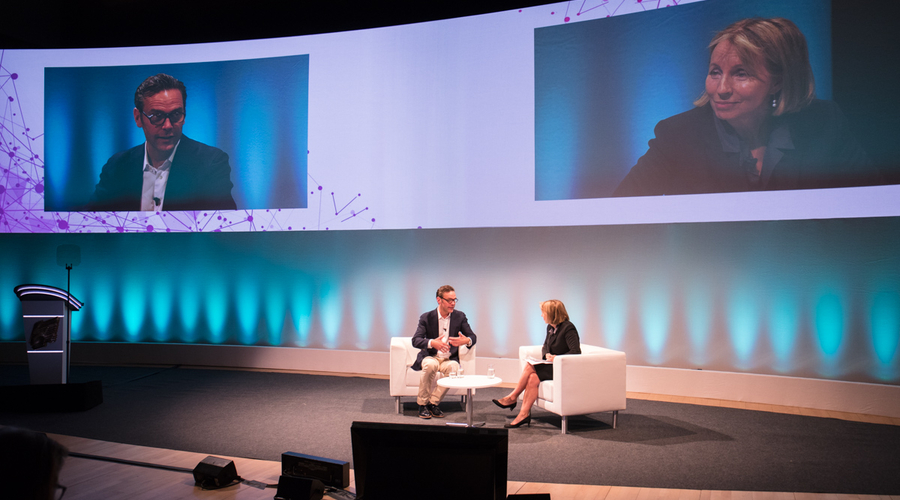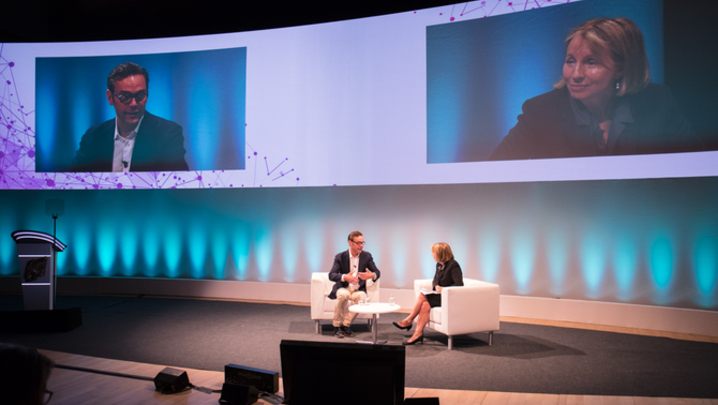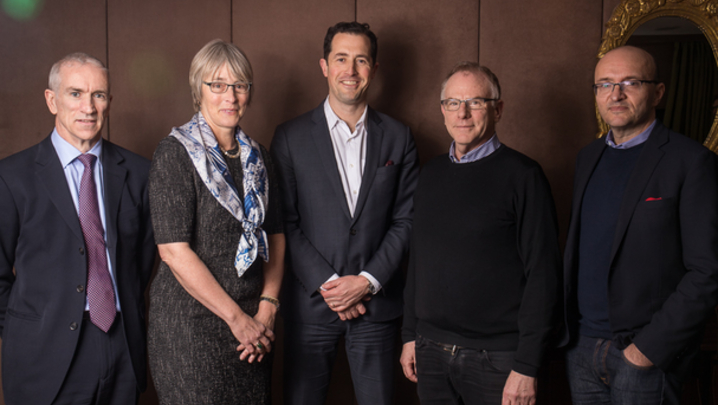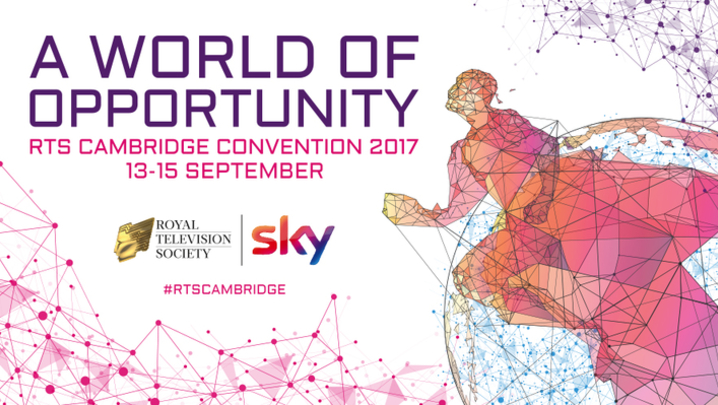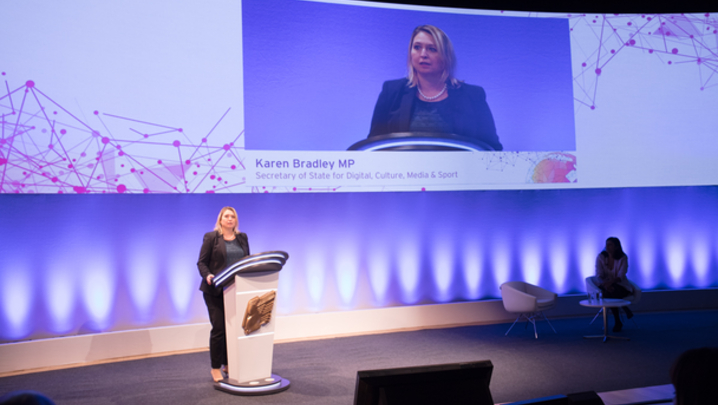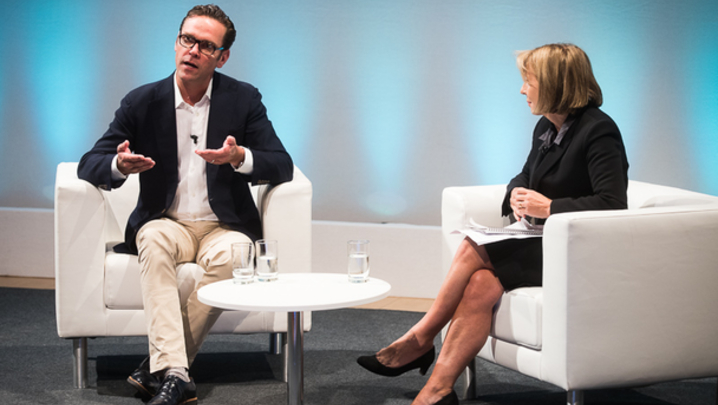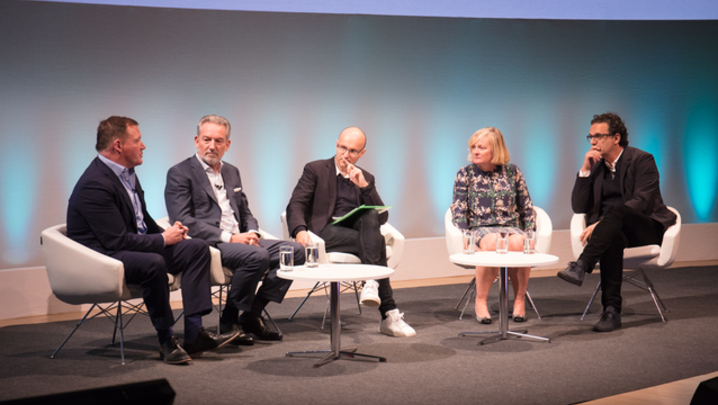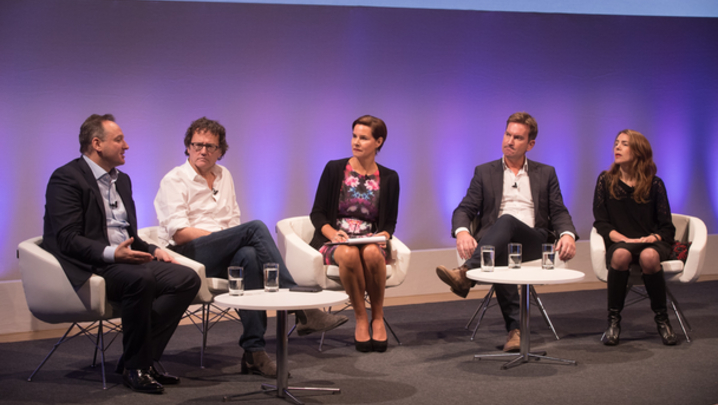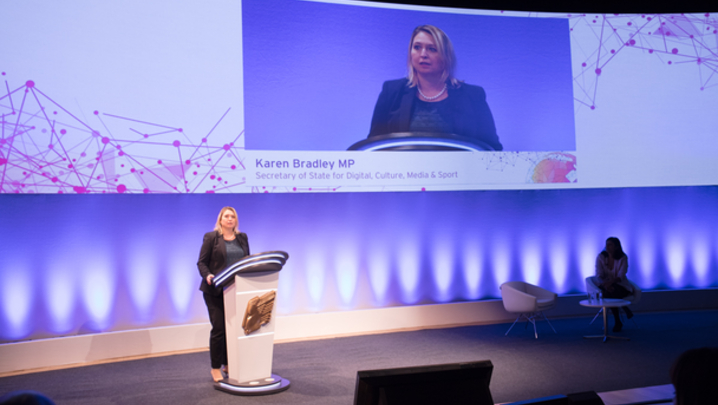(Check against delivery)
Thank you, and good morning everyone.
Thanks especially to Sarah Sands for chairing this session, and to my colleagues Andrew Griffith and Gary Davey for roping me into this.
The theme for this talk and conversation is “the challenges of a shifting media landscape”, and the title of this year’s convention is “A World of Opportunity” – so I’m happy to be here to talk with you about those things, and to suggest that in answer to the challenges that present themselves today it’s of paramount importance to embrace that world of opportunity with open arms. Tomorrow’s commercial media needs to be able to compete globally, and at unprecedented scale, and the opportunity that that embrace provides – creatively, commercially, for our businesses, our customers, and our communities – is immense.
Moreover, as we’ve seen so clearly in the last decade (as Andrew pointed out in his opening remarks) since Sky last chaired this convention -- and I think I was CEO then -- an appetite for disruption has been the essential ingredient for success in the digital world, a world that we all inhabit today, like it or not.
At 21CF, and at Sky, we always talk about change not as an outside force, but as a tool, an energy that must be deployed. We strive to stoke a zeal for change, not a hardy defense against it.
Much of what drives 21CF is born out of a hundred year history fueled by exploration, invention and a restless taste for disruption.
We’re a company that’s been built by asking big questions and taking even bigger risks.
We have always looked to drive transformation, not simply adapt to it.
We know from experience that those businesses willing to take risks, to put their customers first, and to invest in themselves will not only be the businesses that succeed, more importantly, they’ll be the ones that actually shape the future and make history.
It’s a culture that is more valuable, and necessary, by the day.
New entrants, along with our longstanding storyteller competitors, will shape a future that will be defined by constant connectivity, nearly limitless choice and non-stop innovation. And many of these firms are competing and creating across multiple geographies, with vast resources to bring to bear in the pursuit of a consumer experience that earns attention and engagement from millions and billions of customers. This competitive environment is unprecedented and the demands it places on any storytelling business are profound.
But to us, this environment of ubiquitous connectivity means more opportunities to share more of our stories and to deliver them in new and exciting ways.
New delivery platforms mean room to innovate in how those stories are consumed.
And ever-expanding plurality of choice gives us the chance to stand apart with brands that matter.
And, as a company like ours that aspires for itself a role in charting the future, there has never been a better time than now when every aspect of the storytelling experience stands to be enhanced by technology.
Our appetite for exploration and invention has been with us for over a century, from the very first day William Fox founded the Fox Film Corporation in 1915.
Investing in great brands is the key to standing out from the chaos.
With an independent mind, global outlook and zeal for innovation, William Fox laid the foundation for the movie business artistically, technologically and from a business standpoint.
For our company, which acquired the studio in the mid-nineteen eighties, his legacy inspires our never-ending quest for new ways to tell great stories, which, for us, began with journalism.
In its first few decades, Fox had acquired Movietone patents, created the first ever widely distributed audio-visual news service, and pioneered the use of sound in film.
Those early video experiences introduced hundreds of millions of people the world over to new storytelling delivered on new platforms.
It marked the largest advances in the consumer experience ever witnessed at the time and exposed audiences to international filmmakers who became creative pacesetters for Hollywood.
Since acquiring Twentieth Century Fox Film, we’ve made a virtue of taking big risks, even when the skeptical voices were all but deafening.
We developed the Fox Broadcast Network, a venture almost universally dismissed at its inception which went on to become the fixture of the US media landscape that it is today.
We founded Sky Television here in the UK and Ireland, and later Sky Italia and Sky Deutschland, dramatically enabling a step change in plurality in all five markets we serve. Indeed, our commitment to independent news maybe has no better exemplar than TG24 in Italy, where up against a monolithic competitive monopoly, we carved out a space for fair and reasonable discourse in current affairs that was sorely lacking in the marketplace. Our creative investment, too, has grown steadily, and the distribution platform has evolved rapidly to be a world leader for our customers.
Star, over the course of our 25-year commitment to the Indian market, has grown into one of that nation’s most revered brands and a world-class business. Reaching hundreds of millions of families through digital TV, free TV, and the mobile web.
And at our joint-venture company Hulu, we’re joining in to the dramatic up-ending of the existing US distribution business brought on by a new wave of over-the-top entrants, and redefining the user experience, bringing new competition to what had been a calcifying TV distribution landscape.
And with each advance, we doubled down with programming just as risky; from America’s first sketch comedy show made by and starring African Americans with In Living Color, to the infamous but redeemable and universally empathetic characters in The Simpsons, to the massive investments in groundbreaking storytelling that James Cameron’s blockbusters Titanic and Avatar required.
Of course, not every risk pays off -- but overall, these bets marked the company’s transformation into a global creative disruptor, a journey that we remain committed to.
Against that backdrop -- of risk taking and embracing change – I’m an optimist.
 Before long all video entertainment, sports, and news will be consumed over IP streaming networks. And as wireless and broadband connectivity become ubiquitous, the net effect is that all content will be available to everyone, all the time. We’re almost there today – in a world of ultimate plurality.
Before long all video entertainment, sports, and news will be consumed over IP streaming networks. And as wireless and broadband connectivity become ubiquitous, the net effect is that all content will be available to everyone, all the time. We’re almost there today – in a world of ultimate plurality.
Companies that didn’t even exist a decade ago, or at least had no content production capability, are now part of a global content ecosystem that produces hundreds of thousands of hours of premium content each year, alongside a burgeoning mass of consumer-producers uploading tens of billions more.
And while we will lament the passing of some brands – that find themselves sub-scale, or under-invested, or clinging to outdated distribution and form factors – we can welcome the many more that are displacing them, providing more choice, and more diversity of output, than we’ve ever seen before.
This puts some burden of responsibility on the customer – as the sameness of the voices-of-god on the nightly news has been complemented by something rather more diverse but also raucous and cacophonous – but that genie, animating your Facebook news feed and all new forms of discovery, I’m afraid is already well out of the bottle.
With this context, I’d like to spend a minute on a few aspects of how we approach this.
First, we remain fanatically focused on building brands that matter.
The defining feature of our times is the bewildering volume of creative content just a click away. And our choices only continue to grow.
Investing in great brands is the key to standing out from the chaos.
I’m sure you’ve all experienced it. Those hours wasted scrolling through listings – the all-too recognizable symptoms of apathy and frustration, and in answer to it the inevitable filter bubble that the ‘paradox of choice’ gives rise to.
The best brands, hallmarks of quality and dependability, are identifiers – signs that help us discover but also enable a curatorial identity that doesn’t diminish serendipity in the way that simple search terms and algorithmic optimization for “engagement” do.
Today, we’re immensely proud of the strong identities fostered within each of our diverse brands.
Viewers know what to expect when they watch something from National Geographic, or Fox Sports, or FX -– just as viewers in the UK and across the EU know what to expect when they download a box set from Sky Atlantic.
Nothing exemplifies our commitment to brand authenticity better than National Geographic Partners, a company we formed in 2015, after a decades-long partnership with the National Geographic Society to combine the commercial enterprise of the Society with our pre-existing joint-venture television channel.
In doing so, we created a global multi-media business, spanning the written word, the still image, moving pictures, cartography, travel, and more.
National Geographic today is not only as authentic and true to its core brand as ever, but is also able to invest at scale in mission-driven content, delivered to a global audience.
“Made in the UK” is shorthand for storytelling that is smart, acerbic, relevant, and entertaining
This year, National Geographic Partners will invest $100M more on original content production than it did just a few years ago, at the same time as contributing over a quarter of its profit directly to the Society’s work in science, education, conservation, and exploration.
This is on top of providing an endowment of close to $1 billion to ensure the Society’s enduring impact for generations to come.
And thanks to an innovative digital strategy, driven by the creators themselves – National Geographic’s explorers and photographers -- the brand reaches more consumers on platforms like Instagram, Twitter, and Facebook than almost any other in the world.
And within these brands, the diversity of our storytelling is paramount.
Even across an increasingly more crowded landscape, there remains enduring opportunity for more diverse storytelling, and our output reflects that belief.
We’ve moderated presidential debates, connected communities with local news, mapped the farthest corners of the planet, explored the opioid epidemic, gender identity, and race relations, reinvented the ancient Indian sport of Kabbadi, told powerful stories of slavery in America, the rights of women in Pakistan, and the coming and inevitable exploration of Mars, which will mark the advent of the age of interplanetary species, which doesn’t even come close to scratching the surface of the scope of the stories told by the artists and brands we support.
We believe that the strength of our portfolio rests in the authenticity and diversity of the stories we can tell -- and our growth will be predicated on continuing to champion that idea: that we can create a platform for storytellers to do the best work of their lives.
Our global investment in local storytelling has proved especially fruitful at STAR India.
With a reach of approximately 720 million viewers a month and more than 30,000 hours of story every year in eight different Indian languages, STAR India appeals directly to the demands and aspirations of its customers.
Like Aamir Khan’s Satyamev Jayate (SMJ), or Truth Alone Prevails, some of the boldest programming in Indian television tackled some of the nation’s most pressing social and economic issues, from water scarcity to female feticide.
And thanks to the digital investment with Hotstar in India, downloaded by well over 100M active users – with more than double the watch time of all its competitors combined – the reach of authentic Indian storytelling, both in-country and abroad, has never been greater.
These projects are emblematic of a deliberately diverse approach: to not simply chase blockbusters or commission by algorithm, but instead to empower artists to say and do hard things.
This is true in Italy, in Argentina, in California, and everywhere we operate. In the UK, 21st Century Fox and Sky invested around £700 million last year in original production, and we intend to continue at least that level of investment while building on Sky's already outstanding original pipeline.
From our investment in Shine Group, we created the creative powerhouse that is Endemol Shine, one of the UK’s largest production groups.
It is also one of the country’s leading producers of scripted programming with shows such as Black Mirror, Broadchurch, and Humans, which are sold, watched, and loved in more than 100 countries.
Globally, Endemol Shine is among the world’s most prolific creators, with 700 productions in 66 countries.
It’s one of many film and television brands stamped “Made in the UK,” a distinction with global resonance – shorthand for storytelling that is smart, acerbic, relevant, and entertaining.
Look no further than Matthew Vaughn’s film Kingsman: The Golden Circle an inherently British film in both its conception and its execution – and particularly its humor – shot in the UK and opening around the world in a few weeks.
Such distinctiveness in brand is a tremendous asset to the UK, and an important element of any country’s ability to hold a place in the future content economy.
The UK creative brand, plus the balanced creative economy, with strong public service output, a vibrant commercial sector, and a diverse and independent tradition of impartial news, adds up to an environment poised for innovation and growth that we believe overshadows many larger markets.
As a global company, we have an obligation to seek opportunities across geographies and markets around the world.
And it is from this point of view, and with that frame of reference, that we believe this is for us the best place to be proposing a nearly £12 billion investment – an investment we expect will be a significant driver of the UK creative industry’s long-term success in a global market.
Sky today is everything a great creative company should be: it is imbued with a culture that nurtures ingenuity and innovation. It has reach, room to grow, and has worked diligently to become one of Europe’s great, trusted brands, powered by a distinctive creative outlook.
When I joined Sky in 2003, there was a special opportunity to innovate.
For me, having been born in the UK, it was a chance to create a new home back home, and to create a new business out of a successful, but decelerating company.
Nurturing, challenging, and adding to a team of people who were passionate about investing deeply in the UK, we achieved a new velocity for the business, with a big ambition for our customers.
We invested more in programming and technology, and created new services, like Sky Broadband, that were game changers for our customers.
We also maintained and increased our investment in Sky News.
And as I have said before, I am deeply proud of the journalistic standards at Sky News, the tremendous value it provides to the communities it serves, and the recognition it receives globally: the International Emmy that it won for its coverage of the 2005 London bombings, and the fact that it has been voted the Royal Television Society’s news channel of the year for a record ten times.
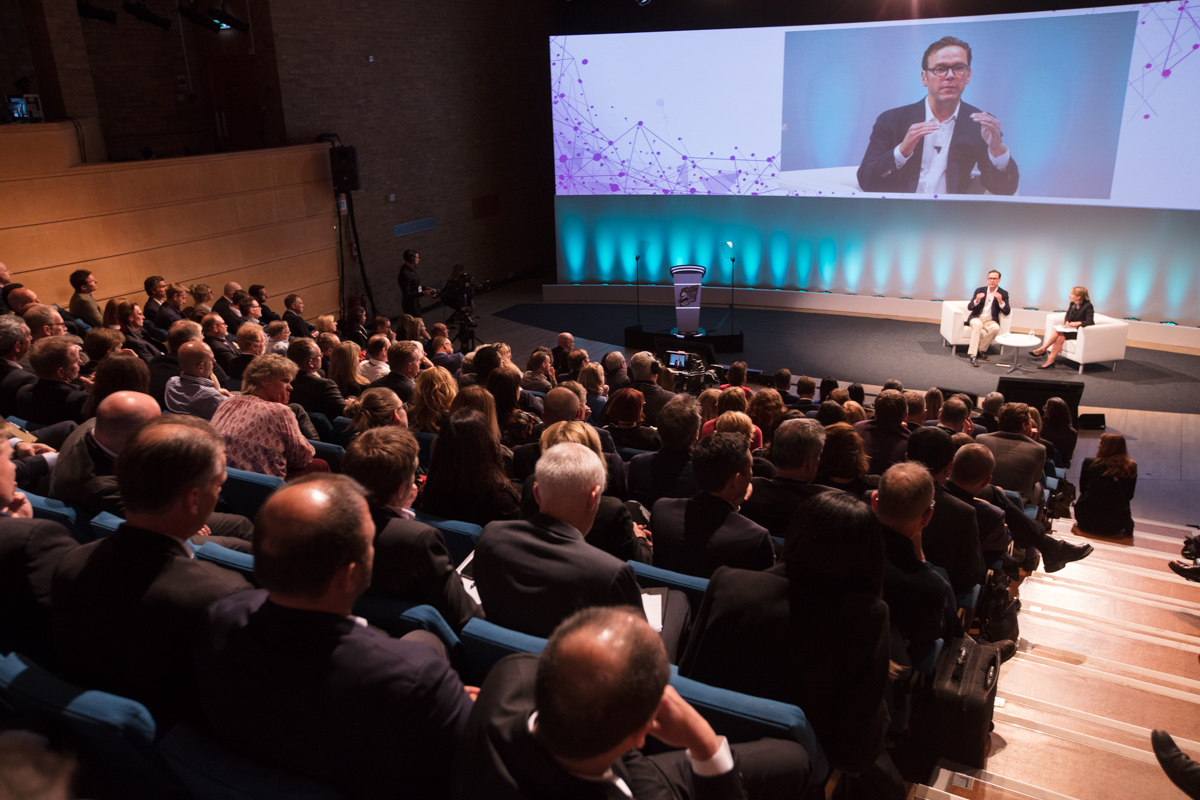 I’m also proud of its track record of innovation within the British tradition of television news provision, while also reaching new markets with Sky News Arabiya and expanded distribution around the world.
I’m also proud of its track record of innovation within the British tradition of television news provision, while also reaching new markets with Sky News Arabiya and expanded distribution around the world.
Under Jeremy Darroch’s leadership as CEO, the company has reached new heights and is today a world leader, not just a local champion, in an intensely competitive sector.
At 21CF, we often speak about simplifying our business, focusing on core brands and creative output that matters, and taking the many steps required to get there.
We have shed non-core assets, consolidated joint-ventures, invested in our core operations, created new capability sets within the group, and simplified our management structure, all as part of a core re-alignment of the company around the future of video.
And with our December announcement to acquire the balance of Sky and wholly consolidate the business, we took another major step in our pursuit of that goal.
But as our heritage tells us, past performance is no guarantee of future results.
Although brands that matter and diverse storytelling will remain necessary conditions, we will still need the freedom to take risks and the strength to compete that only comes from global scale.
Scale provides the confidence to invest strategically, take risks, and support the development of new technologies and innovation – critical attributes in this dynamic period.
It’s what allows us to take big creative swings and empower a diverse range of creators to tell breakthrough stories that can drive meaningful change.
But we’re not after scale for scale’s sake, nor should scale come at the expense of authenticity and quality.
Those factors all played into our rationale for moving forward with this transaction, built on our belief that there exists huge opportunity for companies and countries willing to act decisively and capitalize on the economic and social benefits that this industry can create.
Inward investment in the UK creative economy, and the positive signal it sends to companies around the world, is more important than ever as the UK prepares to chart a course outside the EU.
Indeed, the soft power of the UK’s creative identity is going to be a big part of that story.
And so, if the UK truly is “open for business” post Brexit, we look forward to moving through the regulatory review process and this transformative transaction for the UK creative sector becoming an affirmation of that claim.
We’re eager to provide Sky with access to the resources, reach, and creative sparks needed to keep pace against a new breed of competitors that now include some of the largest companies in the world, but none of whom have the local depth of investment and commitment to the UK and to Europe.
But our commitment is about more than market success. Companies have to mean something to their communities, to their customers, and to their shareholders.
When we launched the Bigger Picture initiative at Sky, we articulated an aspiration for us to be better – for companies to be better, and to behave in the way that we imagined we would want to and be expected to in the future.
This wasn’t a question of doing penance through corporate social responsibility, but rather an idea that the investment and enterprise that a firm can actually make, would actually be – in and of itself – more than a driver of profit.
What the team at Sky are doing with Sky Arts and with the Oceans Rescue, to name just two projects, are all part of this same belief system – this idea that companies should embrace what their customers and people care about, and that by doing so, it makes them stronger.
Our environmental initiatives, pioneered at Sky and also pushed forward at 21st Century Fox, have made us better companies, and better for our communities.
So has National Geographic’s programming, like the Leo DiCaprio documentary Before the Flood that has engaged a global audience on the pressing subject of climate change and the imperative for action.
Our work with the Ghetto Film School at 21CF is beginning to build an inclusive pipeline of young storytelling talent.
Learning about the GFS student’s capstone projects, which this year involved travel to Israel to shoot, direct, and produce a short film, and watching those students interact with the likes of Lee Daniels and David O. Russell, serves as a reminder of the power of story to expand horizons and empower young minds.
No single project exemplifies that truth more than our Oscar-nominated film Hidden Figures this year, the story of three black female mathematicians who helped NASA put a man into space, inspiring a generation of young people to dream bigger, push further, and question those who would dare put limits on what they can achieve.
We were honored to share the story of those trailblazers with audiences around the world, and thrilled to support the U.S. State Department’s first-ever film-inspired exchange program, including 50 female STEM leaders, each from a different country.
It’s a true privilege to support these types of stories and amplify their reach, at a time when we so badly need more diverse and unique voices.
And so, to return to that story of change that has so far characterized the new millennium, I can think of no industry more exciting to be a part of.
At only three years old, but with a rich heritage, 21st Century Fox has both the spirit and stamina to help define and shape what this business of ideas looks like over the next 100 years; indeed, doing so is central to who we are.
That’s because creating powerful art that earns attention, nurturing big brands that matter, and producing stories as diverse as the populations they serve – are the essential ingredients for long term success and growth.
And I am hopeful that here in the UK, a major chapter of our company and the entire industry will be written, with benefits shared broadly across the economy and society. Indeed, everything we have done – from the invention of Sky News to TG24, to the Fox Broadcast Network and Star Plus, from Hull to Hyderabad -- has been about increasing choice, amplifying diversity, adhering to the highest broadcast standards inside a plurality machine that we, optimistically, call 21st Century Fox.


